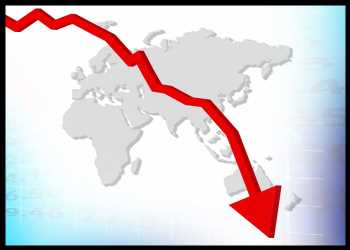
Asian Markets Track Wall Street Lower
Asian stock markets are trading mostly lower on Tuesday, following the broadly negative cues from Wall Street overnight, as traders remain concerned aggressive monetary policy moves by central banks across the world could tip the global economy into recession next year. Traders continued to refrain from creating fresh long positions. Asian markets closed mostly lower on Monday.
Amid lingering worries over a possible recession, the uncertainty over China’s economic reopening as the country battles a wave of Covid infections is also weighing on the markets.
The Australian stock market significantly lower on Tuesday, extending the losses in the previous three sessions, with the benchmark S&P/ASX 200 falling below the 7,100 level, following the broadly negative cues from Wall Street overnight, with weakness across most sectors, led by losses in resources and technology stocks.
The benchmark S&P/ASX 200 Index is losing 47.80 points or 0.67 percent to 7,086.10, after hitting a low of 7,071.40 earlier. The broader All Ordinaries Index is down 55.10 points or 0.75 percent to 7,265.90. Australian stocks closed modestly lower on Monday.
Among the major miners, Rio Tinto and Fortescue Metals are down almost 1 percent each, while BHP Group is losing more than 1 percent and Mineral Resources is declining more than 2 percent. OZ Minerals is gaining almost 1 percent.
Oil stocks are mostly weak. Beach energy and Origin Energy are losing almost 1 percent each, while Woodside Energy and Santos are edging up 0.1 to 0.2 percent each.
Among tech stocks, Xero and WiseTech Global are slipping more than 3 percent each, while Zip and Appen are declining more than 1 percent each. Afterpay owner Block is losing almost 4 percent.
Gold miners are mostly lower. Northern Star Resources, Gold Road Resources and Evolution Mining are losing almost 2 percent each, while Newcrest Mining is down more than 1 percent. Resolute Mining is flat.
Among the big four banks, Commonwealth Bank, ANZ Banking, National Australia Bank and Westpac are all edging down 0.1 to 0.3 percent each.
In other news, shares in Domain Holdings Australia are plunging almost 8 percent after the digital property portal updated the market that conditions in the real estate market have deteriorated since its annual general meeting.
Shares in Johns Lyng Group are shedding more than 10 percent after its COO Lindsay Barber sold 31 percent of his stakeor about 4 million shares in the property services group.
In economic news, the Reserve Bank of Australia will release the minutes from its monetary policy meeting on December 8.
At the meeting, the RBA raised its key interest rate by a quarter-point for a third straight policy meeting, thus slowed the pace of rate hikes from a more aggressive 50 basis points previously as policymakers turned less hawkish amid expectations for slower economic growth ahead.
In the currency market, the Aussie dollar is trading at $0.669 on Tuesday.
The Japanese stock market is modestly higher in choppy trading on Tuesday, snapping the three-session losing streak, with the Nikkei 225 moving above the 27,300 level, despite the broadly negative cues from Wall Street overnight, with traders buying stocks at a bargain after the recent losses, while remaining cautious ahead of the Bank of Japan’s decision on interest rates later in the day.
The benchmark Nikkei 225 Index closed the morning session at 27,315.54, up 77.90 points or 0.29 percent, after touching a high of 27,339.49 earlier. Japanese shares ended sharply lower on Monday.
Market heavyweight SoftBank Group is edging down 0.2 percent, while Uniqlo operator Fast Retailing is gaining 1.5 percent. Among automakers, Honda is edging up 0.2 percent, while Toyota is edging down 0.5 percent.
In the tech space, Advantest is gaining more than 1 percent and Screen Holdings is adding almost 1 percent, while Tokyo Electron is edging down 0.2 percent. In the banking sector, Mitsubishi UFJ Financial and Mizuho Financial are gaining almost 1 percent each, while Sumitomo Mitsui Financial is adding more than 1 percent.
The major exporters are mostly higher. Canon and Mitsubishi Electric are gaining almost 1 percent each, while Sony losing almost 1 percent. Panasonic is flat.
Among the other major losers, Kawasaki Kisen Kaisha is gaining almost 4 percent, while T&D Holdings and Keisei Electric Railway are declining almost 3 percent each.
Conversely, there are no major losers.
In economic news, the Bank of Japan will wrap up its monetary policy meeting on Tuesday and then announce its decision on interest rates. The BoJ is widely expected to keep its benchmark lending rate unchanged at -0.10 percent.
In the currency market, the U.S. dollar is trading in the lower 137 yen-range on Tuesday.
Elsewhere in Asia, New Zealand, China, Hong Kong, Singapore, South Korea, Malaysia, Taiwan and Indonesia are lower by between 0.1 and 0.5 percent each.
On Wall Street, stocks closed lower on Monday, extending losses to a fourth straight session, as rising concerns over a recession amid rising interest rates hurt sentiment. The Federal Reserve last week indicated it plans to continue raising interest rates next year, leading to worries the aggressive monetary policy tightening will tip the economy into a recession.
The major averages all ended notably lower. The Dow settled with a loss of 162.92 points or 0.49 percent at 32,757.54, the S&P 500 dropped 34.70 points or 0.90 percent to settle at 3,817.66, and the Nasdaq ended lower by 159.38 points or 1.49 percent at 10,546.03.
Meanwhile, the major European markets moved to the upside on the day. The U.K.’s FTSE 100 Index gained 0.4 percent, the German DAX Index added 0.36 percent and the French CAC 40 Index advanced 0.32 percent.
Crude oil prices climbed higher on Monday amid optimism about increased demand for oil from China after the country relaxed certain COVID-related restrictions. West Texas Intermediate Crude oil futures for January ended higher by $0.91 or 1.25 percent at $75.20 a barrel.
Source: Read Full Article